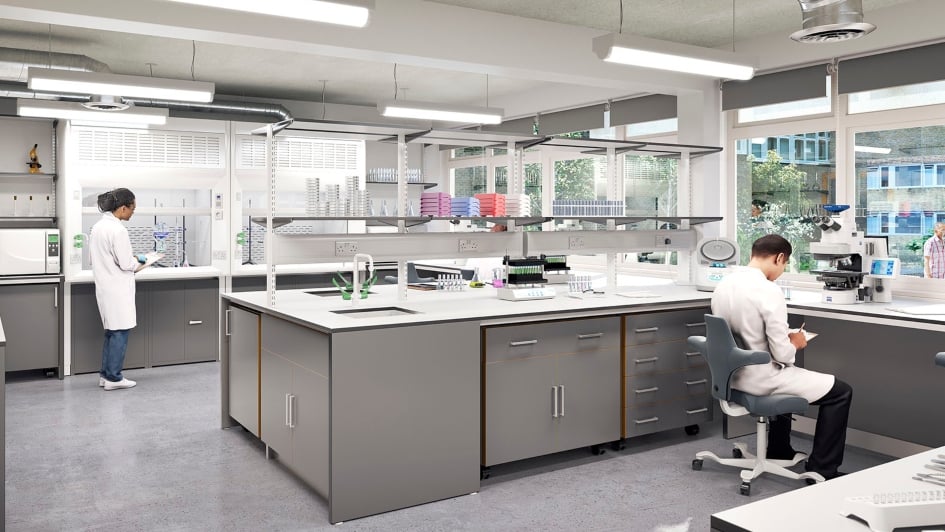-finalv2_sml945x532.jpg?sfvrsn=16a52f69_0)
A fundamental shift is happening right now in the UK life-science sector.
Companies have been moving away from the traditional ‘science park’ working model – with stand-alone developments in out-of-town places – and are making major investments in city-based laboratories and workspaces.
Science is increasingly taking place in ‘open collaboration’ between industry, academics, and other partners such as NHS hospitals.
Often these centres are close to universities that are already famous for pioneering new approaches in science, medicine and healthcare. In London, they include Imperial College London and White City, the Francis Crick Institute and the developing Knowledge Quarter in Kings Cross, and us at The Institute of Cancer Research at The London Cancer Hub in Sutton, South London.
But why is this shift happening?
1. Academic innovation and expertise
One of the reasons we’re seeing more life-science developments in UK cities, especially in the ‘golden triangle’ of London, Oxford and Cambridge, is that many of the most innovative new ideas in the sector come from our universities. Companies want to work with academics to develop their ideas and scale up their discoveries.
The development of the Oxford-AstraZeneca Covid vaccine is one of the most famous recent examples of academic-industry collaboration, although ultimately, the development of most modern medicines has been underpinned by academic discovery allied with industrial development, from antibiotics to immunotherapy.
At the ICR, the past few years have seen the discovery and development of multiple new cancer drugs, and the development of pioneering new radiotherapy technology, in collaboration with industry partners.
2. Record investment
There is a record level of investment in the UK life sciences right now, according to the latest figures from the BIA, with investment in UK biotech at £4.5 billion in 2021. Venture capital investors are backing biotech companies and we’ve seen notable initial public offerings (IPOs) of companies spinning out from academia – such as Oxford Nanopore and Monte Rosa Therapeutics, the latter of which was originally a spin-out from ICR science and listed last year on New York’s NASDAQ stock exchange.
This kind of investment is leading to a surge in demand for quality laboratory space. MedCity, which represents the life-sciences across London and England’s South East, recently reported a four-fold increase in demand for life sciences real estate over the past five years, and demand is rising faster than supply.
3. Working from home
For property investors – across the world as well as the UK – the life sciences is an attractive proposition partly because of the changes to our working lives caused by Covid.
In a new era of home working for ‘office’ workers, property developments have become more attractive to investors if they include spaces that anchor professionals there – like laboratories, which of course many scientists cannot work without. You can’t work from home if you need a lab!
There was a trend towards major urban developments in the life sciences even before Covid, but pandemic-era announcements by the likes of Merck and AstraZeneca suggest this could be a longer-term change.
4. Intellectual property
Some analysts point to an ongoing transition to open innovation in the Big Pharma business model that involves being receptive to rapidly adopting innovations from outside their own walls, including from the academic sector.
This business model involves shifting some of the focus from in-house research and development to being primed to act when intellectual property, like that emerging from academic institutions and their spin-outs, becomes available – as well as working in collaboration with academics and smaller companies, by co-locating with them.
5. Recruitment
Analysts also point to recruitment as a key strategic reason to be based near cities and academic districts – close to the thriving cultural hubs where people want to live, and where they might find the best new recruits coming straight from the academic centres. And where it is easy to move between different companies as they grow and evolve.
… and 6. The Innovation Gateway
So why should companies looking for lab space consider taking space here at The London Cancer Hub?

The Innovation Gateway is a new, modern laboratory and collaboration space that is set to become home to a variety of life-science companies – and definitely ticks the box for academic innovation and expertise.
The development contains around 6,300 square feet of space, of which about 3,500 square feet is new laboratory space – and we’re looking for licensees now, especially those working in fields related to oncology.
It’s part of The London Cancer Hub – a partnership led by the ICR and the London Borough of Sutton which aims to generate around 7,000 new jobs in the life sciences, and create the world’s leading life-science campus specialising in cancer research, treatment, education and enterprise.
Modern facilities
Licensees at the Innovation Gateway will benefit not only from new modern facilities in the building itself, but also potential collaborations with scientists at the ICR – which is already a world leader in collaborating with industry partners to translate its discoveries into benefits for patients, including through the discovery and development of new cancer drugs.
There’s also potential access to the ICR’s state-of-the-art scientific and other facilities and a location adjacent to our partner hospital – the Royal Marsden NHS Foundation Trust. And all at a location in Sutton, South London, affording easy access into Central London while at the same time being close to the desirable Surrey hills.
One of London’s greenest boroughs, Sutton is also home to some of the UK’s best secondary schools – and there’s even a fantastic new school on site at The London Cancer Hub.
So if you’re a company interested in taking space here, get in touch!
With thanks to Jack Sallabank at Future Places Studio
comments powered by